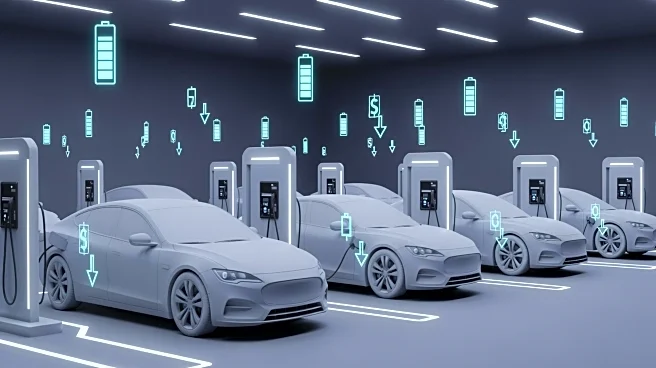What's Happening?
The auto industry is experiencing a quiet revolution as electric vehicle (EV) battery prices continue to decline, making EVs more affordable and accessible. According to industry reports, battery prices are
expected to drop by 70% over the next five years, which will significantly impact the retail prices set by car manufacturers. This trend is anticipated to bring battery electric vehicles (BEVs) below price parity with traditional vehicles in Europe within two to four years, and even sooner in China. The introduction of new EV models, such as the 2026 Nissan LEAF and Tesla's more affordable Model 3 and Model Y, reflects the industry's shift towards offering long-range, affordable electric cars.
Why It's Important?
The reduction in battery prices is crucial for the widespread adoption of electric vehicles, as it addresses one of the main barriers to entry: cost. As EVs become more affordable, they are likely to gain a larger share of the automotive market, reducing reliance on fossil fuels and contributing to environmental sustainability. The shift towards electric vehicles also presents opportunities for innovation and growth within the automotive industry, potentially leading to new business models and technological advancements. Consumers stand to benefit from increased choice and competitive pricing, while governments may see progress towards climate goals.
What's Next?
Automakers are expected to continue developing and releasing new EV models with improved range and affordability. The industry may see a diversification of EV offerings, catering to different consumer needs and preferences. As battery technology advances, the market could witness the introduction of more budget-friendly EVs, further accelerating the transition from internal combustion engines to electric power. Policymakers may also play a role in supporting this transition through incentives and infrastructure development.
Beyond the Headlines
The ongoing shift towards electric vehicles may have broader implications for energy consumption and environmental policy. As EV adoption increases, there may be a greater demand for renewable energy sources to power these vehicles, influencing energy markets and infrastructure. Additionally, the transition could lead to changes in urban planning and transportation systems, as cities adapt to accommodate electric vehicles and charging stations.









